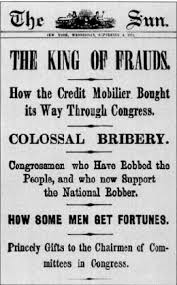
I agree with him. But what I find more intriguing is his eagerness to hide the information from the public to begin with. Why hide the family skeletons? If anything, isn't he impressed that the producers were able to uncover so much information about his ancestors?
As a novelist researching the history of one of New York's more famous families: the Durants, I ask myself whether what I am discovering will come as a surprise to the descendants, especially as I find new information that was not available in previous biographies.
History however is a moving target as new things are discovered. Take for example the history of the Credit Mobilier scandal of 1868.
This front company was established by Dr. Thomas Durant to handle construction contracts for the Union Pacific Railroad. At the time of its inception Durant was Vice President of the Union Pacific. As one of the founders of the Credit Mobilier he also benefited financially from the contracts he negotiated with the U.S. Government.
Even more scandalous was that he bribed politicians to look the other way while the Credit Mobilier charged exorbitant prices for the construction work. Given the propensity for fraud during the 'Gilded Age' the question is - did the men in power know what they were doing was wrong, or just par for the course?
In the case of Dr. Durant, who was never legally implicated in the Credit Mobilier scandal, (he was ousted from the board in 1867 before it became public) he may have known that history would not look favorably on his actions: why else would he have put all of the ledgers of the Credit Mobilier in a safe deposit box that he never told anyone about?
This box was discovered by one of the family lawyers, after Dr. Durant and his son William were dead. It was William's second wife Annie that saved these documents from a burn pile.
In 1937 Annie contacted Levi O. Leonard, a railroad historian who she knew was collecting Durant history. She notified him that she had in her possession more Durant documents, stating..."these papers had turned up in a lawyer's fire-proof vault -- where they evidently [had] been put years ago for safe keeping."
Safe keeping? Or hiding? These were the ledgers from the Credit Mobilier Company dated 1863-68 and enough information to blackmail some major political figures of the time.
Leonard immediately went to New York City to pick up the documents and bring them to the University of Iowa where he was cataloging his research.
William Durant must not have known about these papers. He had donated what he thought were all of his father's Union Pacific papers to Leonard in 1926, telling him that he knew Leonard would do "justice to my father's memory".
I can only believe that if William knew about these discriminating Credit Mobilier documents when he was alive he would have destroyed them. But like Ben Affleck, you can't run from your ancestors. The lesson here is to embrace them, with all of their flaws and weaknesses, because they are after all, part of history.
 RSS Feed
RSS Feed
